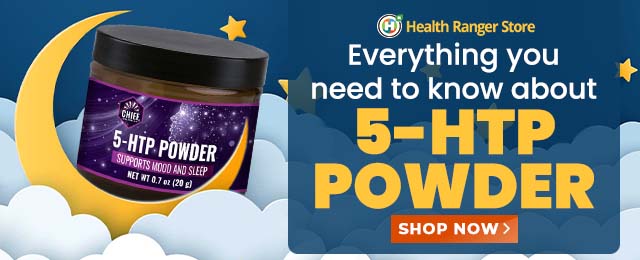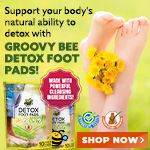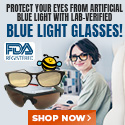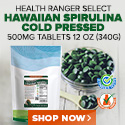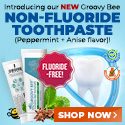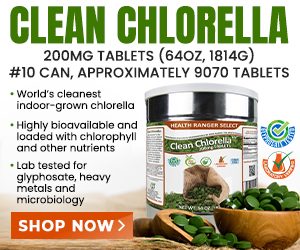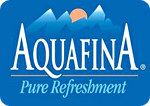
Pepsi admits Aquafina comes from tap water
 Thursday, August 02, 2007 Thursday, August 02, 2007by Mike Adams, the Health Ranger Editor of NaturalNews.com (See all articles...) Tags: bottled water, Aquafina, PepsiCo |
- Massachusetts pediatrician conscripts law enforcement, unleashes nationwide manhunt for Fitchburg family-of-five who declined vaccinations for their healthy kids
- Coffee contains powerful antioxidants that protect the brain and heart
- Brain-boosting foods: the key to unlocking cognitive potential and mental well-being
- Scientists uncover hidden world of alien-like creatures beneath Antarctic ice
- CBS accused of whitewashing child sacrifice as “cultural practice”; archaeologists and critics push back
- U.S. demands U.K. protect FREE SPEECH, repeal hate speech authoritarianism, in latest trade deal negotiations
- A struggle over energy future unfolds as developers defy executive order
- Major baby food brands exceed California lead limits, risking children’s health
- Russia escalates censorship war, targets over 200 VPN apps amid Google resistance
- Foreign dark money pipeline exposed: $100M funneled through U.S. ballot initiatives to push far-left agenda
- Trump’s surprise role in Japan trade talks signals new economic order
- Analysis: The coming economic collapse, a mass uprising and Trump's three secret weapons to halt the growing revolt
- Trump administration proposes drastic cuts to State Department, axing funds to UN and NATO
- Widespread social and economic unrest: Steve Quayle issues urgent financial warning of imminent asset collapse in new interview with Mike Adams
- WHO Pandemic Treaty sparks global debate over sovereignty and Big Pharma influence
- Aerosolized bioweapons? Strange “diploid biomasses” falling out of the sky in Florida captured under the microscope
- CDC considers scaling back universal COVID-19 vaccine recommendations
- TAKE IT DOWN Act advances in Congress amid free speech concerns
- TAKE IT DOWN Act advances in Congress amid free speech concerns
- Aerosolized bioweapons? Strange “diploid biomasses” falling out of the sky in Florida captured under the microscope
- Widespread social and economic unrest: Steve Quayle issues urgent financial warning of imminent asset collapse in new interview with Mike Adams
- Analysis: The coming economic collapse, a mass uprising and Trump's three secret weapons to halt the growing revolt
- Israeli lobbyists boast of controlling US national security policy in leaked AIPAC audio
- Kiss Your Genetic Privacy Good-Bye! 23andMe Gets Green Light to Sell Your Intimate Genetic Details to Anyone They Want
- U.S. lawmakers investigate Meta over alleged China collaboration
- Mike Adams releases country western hit single: Goin’ Back in Time is Comin’ Home
- Fauci is back in the limelight, and he’s busy promoting a future COVID or FLU pandemic
- CLOT SHOT PLANDEMIC UNFOLDING: Fibrous, rubbery clots caused by covid injections have prion-like seeding activity
- Defunding DEADLY mRNA jabs: Government funding for mRNA technology being scrutinized and sidelined until proven "safe and effective" for real
- Curcumin’s ancient healing power supercharges muscle recovery, and its effects are compounded with anti-inflammatory foods and supplements
- I Want My Bailout Money – new song released by Mike Adams
- I Want My Bailout Money – new song and music video released by Mike Adams
- Federal employees whine over DOGE's new directive requiring them to do a 5-point summary of weekly accomplishments
- Government waste exposed: Hegseth supports Musk’s demand for accountability from federal workers
- European Court of Justice: Healthcare professionals who promoted or administered COVID-19 vaccines are CRIMINALLY LIABLE for any harm caused
- U.S. approves new Russian ambassador as diplomatic thaw continues
- Newly released JFK files reveal Pentagon's role in creating Lyme disease and covid in the same lab
- Analysis: The coming economic collapse, a mass uprising and Trump's three secret weapons to halt the growing revolt
- Aerosolized bioweapons? Strange “diploid biomasses” falling out of the sky in Florida captured under the microscope
- Kiss Your Genetic Privacy Good-Bye! 23andMe Gets Green Light to Sell Your Intimate Genetic Details to Anyone They Want
- Mike Adams releases country western hit single: Goin’ Back in Time is Comin’ Home
- European Court of Justice: Healthcare professionals who promoted or administered COVID-19 vaccines are CRIMINALLY LIABLE for any harm caused
- Widespread social and economic unrest: Steve Quayle issues urgent financial warning of imminent asset collapse in new interview with Mike Adams
- Federal employees whine over DOGE's new directive requiring them to do a 5-point summary of weekly accomplishments
- U.S. approves new Russian ambassador as diplomatic thaw continues
- Government waste exposed: Hegseth supports Musk’s demand for accountability from federal workers
- CLOT SHOT PLANDEMIC UNFOLDING: Fibrous, rubbery clots caused by covid injections have prion-like seeding activity
- Fauci is back in the limelight, and he’s busy promoting a future COVID or FLU pandemic
- I Want My Bailout Money – new song and music video released by Mike Adams
- I Want My Bailout Money – new song released by Mike Adams
- Now you can HEAR chemistry: Health Ranger translates molecules into music in stunning video demonstration that will blow your mind (and your ears)
- Defunding DEADLY mRNA jabs: Government funding for mRNA technology being scrutinized and sidelined until proven "safe and effective" for real
- Trump administration poised to overhaul crypto regulations with new SEC leadership
- South Carolina Congressman proposes new $250 bill and wants Trump on the front
- Red Cross issues warning to stop blood plasma donations from vaccinated people
- Scientists confirm: GENIUS brain function can be spontaneously unleashed in humans without any apparent cause
- EPA advisor admits the agency is funneling billions to climate groups ahead of Trump’s return to White House
- HYSSOP: What research reveals about the health benefits of this ancient holy herb
- Two containers with completed ballots fall out of truck in Florida
- Newly released JFK files reveal Pentagon's role in creating Lyme disease and covid in the same lab
- Mike Adams releases country western hit single: Goin’ Back in Time is Comin’ Home
- Global leaders unite to clamp down on “misinformation” with UN-backed Cascais Declaration
- BREAKING: 2025 NDAA authorizes mandatory military draft of WOMEN across America… as Pentagon pursues global NUCLEAR war with both Russia and China at the same time
- Michael Yon warns of a ZIONIST TAKEOVER in Trump’s second administration
- I Want My Bailout Money – new song released by Mike Adams
- The Health Ranger releases “Vaccine Zombie” song and music video, using AI-animated zombies for the music video
- Ozempic and Wegovy weight loss drugs are injectable LIZARD VENOM PEPTIDES that may unleash a devastating wave of organ failure… side effects align with symptoms of SNAKE BITES
- BOMBSHELL: DNA testing kits are a SCAM to develop ethnic-specific bioweapons
- Israeli soldiers accused of even more torture and abuse in the West Bank
- These 13 countries just signed an agreement to engineer a global FAMINE by destroying food supply
- RFK Jr. clears key hurdle: Sen. Susan Collins backs controversial HHS nominee, signaling a new era for health policy
- NASA admits that climate change occurs because of changes in Earth’s solar orbit, and NOT because of SUVs and fossil fuels
In reality, Aquafina comes from tap water. Yes, the same water you get when you turn on your kitchen faucet. Of course, Aquafina is filtered, purified and perhaps even enhanced with trace amounts of added minerals, but it's certainly not mountain spring water. It's just processed tap water -- the same stuff that fills your toilet bowl when you flush.
Both the International Bottled Water Association (IBWA) and the FDA believe there's really no need to require bottled water manufacturers to admit their products come from tap water. No surprise there -- both these organizations routinely act to protect the interests of powerful corporations, and when it comes to bottled water, the biggest companies are often those sourcing the lowest quality water (such as tap water).
This idea that consumers should not be informed their high-priced bottled water is really just filtered tap water is consistent with the aims of food, drug and beverage corporations, who almost universally agree that consumers should be given less information, not more, about the products they're swallowing. Over the last several decades, corporations have vigorously opposed truth in labeling laws and regulations, including those requiring the labeling of trans fatty acids, sodium content and even ingredients lists! (If the food corporations had their way, all ingredients would be considered "proprietary formulas" and not listed on the label at all.)
This bottled water issue brings to light the apparent deceptive practices of some of the largest suppliers of bottled water products. By avoiding the honest labeling of the source of their water while relying on snow-capped mountain imagery, these companies quietly mislead consumers into thinking their water products are from a pristine, natural source such as a mountain spring.
CAI pressures PepsiCo to tell the truth
PepsiCo only agreed to tell the truth on their bottled water labels after being pressured by Corporate Accountability International (CAI), a non-profit organization that helps protect consumers from corporate abuse. See their website at http://www.stopcorporateabusenow.orgCAI rallied consumers from around the world to complain to PepsiCo about the current labeling of Aquafina, and thousands of consumers slammed PepsiCo's phone lines so hard that the company was forced to shut down call center operations. CAI told NewsTarget that within 30 minutes after the call-to-action announcement went live, PepsiCo's consumer phone lines were no longer being answered and would not allow callers to leave voice mails. Pepsi executives reportedly held an emergency meeting and made a decision to add the phrase, "Public water source" to Aquafina labels.
Reluctantly admitting a small part of the truth
Even then, the phrase "public water source" isn't very descriptive. To some people, the phrase simply implies that Aquafina is itself a public water source. It's not the same as admitting, "Aquafina comes from tap water," which would be a far more honest way to label the product. But PepsiCo seems to have no interest in advertising the source of their Aquafina product, and my guess is that the "public water source" text on the label will be really small and difficult to read. It's much like the labeling of side effects of prescription drugs: They bury the bad news somewhere that most consumers won't ever look.Aquafina is currently the top-selling bottled water brand in the United States. According to CAI, 4 out of 5 consumers now drink bottled water, and 1 out of 5 drink it as their sole water source! (Gee, that's a lot of plastic going to landfill, too...)
The bottles used to package bottled water are almost always made from plastics containing bisphenol-A (BPA), a carcinogenic chemical that often leaches into the water and gets swallowed by consumers. Click here to read our articles on BPA, a chemical widely believed to contribute to certain cancers. This contamination factor, however, is true for all products stored in plastic bottles, not merely water. Sports drinks, sodas, fruit drinks and even "healthy" smoothie drinks packaged in plastic all share a common risk of BPA contamination.
Bottled water vs. public water infrastructure
The widespread shift towards bottled water products is increasingly causing consumers to lose faith in public water infrastructure, which ultimately leads to public reluctance to support investment in public water supplies. This concerns many cities who are worried that a lack of public support will cause funding for water infrastructure to erode.These people tend to describe treated municipal water as remarkably pristine and safe for human consumption. In my opinion, however, tap water should never be swallowed without filtering it, since tap water contains scary levels of toxic chemicals such as chlorine and fluoride, a dangerous water additive chemical often contaminated with arsenic. (Click here to learn the truth about water fluoridation.)
So I wouldn't drink from the public water supply in the first place, but neither do I rely on bottled water. I use a water filtration system to clean tap water before I drink it. (Coincidentally, this is similar to what PepsiCo does when creating Aquafina water, except PepsiCo uses plastic bottles, where I only drink out of glass or stainless steel.)
You can get clean public water in places like Hawaii, Oregon and anywhere that's close to the mountains, but most folks in first world nations are getting tap water that's far from pristine. The public water infrastructure in the U.S. may be among the best in the world, but that's not saying much. I won't even shower in U.S. public water without using a chlorine filter on my shower head. (Recommended brand: Aquasana at http://www.aquasana.com )
My view on PepsiCo
Since this story has much to do with PepsiCo, I thought I would offer my personal opinion on this corporation. In my opinion, PepsiCo is a highly destructive corporation that is partially responsible for obesity, diabetes, depression and bone disorders among hundreds of millions of people around the world. Through its aggressive (and deceptive, in my opinion) marketing campaigns, lack of corporate ethics and ready willingness to exploit human beings for profit, PepsiCo has risen to be one of the most financially profitable yet ethically bankrupt organizations on the planet.If PepsiCo were to disappear from the face of the earth tomorrow, humanity would be healthier the very next day. PepsiCo's brands include: (followed by my opinion statement about that particular brand)
Frito-Lay: Dangerous junk food that contributes to obesity, heart disease, cancer, depression and other serious diseases.
Pepsi-Cola: Toxic beverages that destroy bone mineral density and poison consumers with chemical sweeteners in diet drinks.
Gatorade: Crap sports drinks that contain artificial colors made from petrochemical derivatives.
Tropicana: A low-end fruit juice brand engaged in deceptive labeling for many of its products.
Quaker: This is perhaps the only tolerable brand in the PepsiCo portfolio. Oatmeal is essentially good for you, although instant oats and all the sugars found in many oatmeal products make it a rather high-glycemic food that's not recommended for most people (especially diabetics or obese people).
Put it all together and you have a collection of some of the least healthy foods and beverages on the market today. When future historians examine today's epidemics of obesity and diabetes, they will no doubt scrutinize the role of companies like PepsiCo and Coca-Cola, both of which are partly to blame for modern disease epidemics. Both companies, by the way, continue to engage in routine marketing of junk foods and sodas to children.
Pepsico is a corporation that won't even list the acrylamide content in their fried foods. Nor will it publicly admit that high-fructose corn syrup has any link whatsoever to obesity. PepsiCo, in my opinion, is a corporation living in a deviant reality, unwilling to take responsibility for its role in poisoning the population through its toxic food and beverage products.
That's my personal opinion of PepsiCo, its brands and its products. Personally, I wouldn't buy anything made by PepsiCo. I have no desire to financially reward this company by purchasing its products. If anything, we should all be boycotting PepsiCo products (and Coca-Cola, for that matter) and getting our water from somewhere else.
When traveling through airports, of course, I am sometimes forced to buy Aquafina or Dasani, as nothing else is available. This is the only time you'll ever see me drinking out of a PepsiCo bottle.
If I were in charge around here, I would immediately ban all advertising of junk foods, sodas, snack foods, cigarettes, pharmaceuticals and other harmful substances. It's the only sane thing to do if we care about the future of our children. Of course, such advertising bans will never actually take place because corporations run the government. See my CounterThink Cartoon, Government of the People for a humorous depiction of this current state of affairs.
And as far as Pepsi's water brand goes, I think it should be renamed to AquaFib.
Bottled water at FETCH.news
Get independent news alerts on natural cures, food lab tests, cannabis medicine, science, robotics, drones, privacy and more.
 About the author:Mike Adams (aka the "Health Ranger") is a best selling author (#1 best selling science book on Amazon.com) and a globally recognized scientific researcher in clean foods. He serves as the founding editor of NaturalNews.com and the lab science director of an internationally accredited (ISO 17025) analytical laboratory known as CWC Labs. There, he was awarded a Certificate of Excellence for achieving extremely high accuracy in the analysis of toxic elements in unknown water samples using ICP-MS instrumentation. Adams is also highly proficient in running liquid chromatography, ion chromatography and mass spectrometry time-of-flight analytical instrumentation.
About the author:Mike Adams (aka the "Health Ranger") is a best selling author (#1 best selling science book on Amazon.com) and a globally recognized scientific researcher in clean foods. He serves as the founding editor of NaturalNews.com and the lab science director of an internationally accredited (ISO 17025) analytical laboratory known as CWC Labs. There, he was awarded a Certificate of Excellence for achieving extremely high accuracy in the analysis of toxic elements in unknown water samples using ICP-MS instrumentation. Adams is also highly proficient in running liquid chromatography, ion chromatography and mass spectrometry time-of-flight analytical instrumentation.
Adams is a person of color whose ancestors include Africans and Native American Indians. He's also of Native American heritage, which he credits as inspiring his "Health Ranger" passion for protecting life and nature against the destruction caused by chemicals, heavy metals and other forms of pollution.
Adams is the founder and publisher of the open source science journal Natural Science Journal, the author of numerous peer-reviewed science papers published by the journal, and the author of the world's first book that published ICP-MS heavy metals analysis results for foods, dietary supplements, pet food, spices and fast food. The book is entitled Food Forensics and is published by BenBella Books.
In his laboratory research, Adams has made numerous food safety breakthroughs such as revealing rice protein products imported from Asia to be contaminated with toxic heavy metals like lead, cadmium and tungsten. Adams was the first food science researcher to document high levels of tungsten in superfoods. He also discovered over 11 ppm lead in imported mangosteen powder, and led an industry-wide voluntary agreement to limit heavy metals in rice protein products.
In addition to his lab work, Adams is also the (non-paid) executive director of the non-profit Consumer Wellness Center (CWC), an organization that redirects 100% of its donations receipts to grant programs that teach children and women how to grow their own food or vastly improve their nutrition. Through the non-profit CWC, Adams also launched Nutrition Rescue, a program that donates essential vitamins to people in need. Click here to see some of the CWC success stories.
With a background in science and software technology, Adams is the original founder of the email newsletter technology company known as Arial Software. Using his technical experience combined with his love for natural health, Adams developed and deployed the content management system currently driving NaturalNews.com. He also engineered the high-level statistical algorithms that power SCIENCE.naturalnews.com, a massive research resource featuring over 10 million scientific studies.
Adams is well known for his incredibly popular consumer activism video blowing the lid on fake blueberries used throughout the food supply. He has also exposed "strange fibers" found in Chicken McNuggets, fake academic credentials of so-called health "gurus," dangerous "detox" products imported as battery acid and sold for oral consumption, fake acai berry scams, the California raw milk raids, the vaccine research fraud revealed by industry whistleblowers and many other topics.
Adams has also helped defend the rights of home gardeners and protect the medical freedom rights of parents. Adams is widely recognized to have made a remarkable global impact on issues like GMOs, vaccines, nutrition therapies, human consciousness.
In addition to his activism, Adams is an accomplished musician who has released over a dozen popular songs covering a variety of activism topics.
Click here to read a more detailed bio on Mike Adams, the Health Ranger, at HealthRanger.com.
Take Action: Support Natural News by linking to this article from your website
Permalink to this article:
Embed article link: (copy HTML code below):
Reprinting this article:
Non-commercial use OK, cite NaturalNews.com with clickable link.
Follow Natural News on Facebook, Twitter, Google Plus, and Pinterest
Science News & Studies
Medicine News and Information
Food News & Studies
Health News & Studies
Herbs News & Information
Pollution News & Studies
Cancer News & Studies
Climate News & Studies
Survival News & Information
Gear News & Information
News covering technology, stocks, hackers, and more



"Big Tech and mainstream media are constantly trying to silence the independent voices that dare to bring you the truth about toxic food ingredients, dangerous medications and the failed, fraudulent science of the profit-driven medical establishment.
Email is one of the best ways to make sure you stay informed, without the censorship of the tech giants (Google, Apple, Facebook, Twitter, YouTube, etc.). Stay informed and you'll even likely learn information that may help save your own life."
–The Health Ranger, Mike Adams












